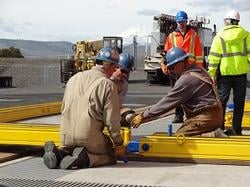
Hydra-Slide empowers customers through training
In an age of technology-driven communication and internet-based learning, Hydra-Slide Ltd. Is taking training back to first principles, offering hands-on instruction on every piece of equipment they design and manufacture. At the forefront of Hydra-Slide’s training program are their Low Profile and Heavy Track skidding systems as well as the Canadian manufacturer’s specialized hydraulic power systems.
Hydra-Slide skidding systems have proven to be one of the most cost-effective and safe methods for moving all types of heavy loads. The heartbeat of these skidding systems is the company’s conventional and synchronous hydraulic power units. The Hydra-Pac Synchronous 10,000 psi hydraulic power units provide synchronized control of multiple hydraulic cylinders, suitable for operation of all Hydra-Slide skidding systems, turntables, climbing jacks and most other double-acting jacking applications.
Robert Young, director of operations and lead trainer at Hydra-Slide, explained that the Hydra-Pac Synchronous power units are often a focal point of training sessions because of their unique operation, which is different than other unified jacking systems. These units, available in diesel, propane or electric models, offer synchronized control of multiple lifting points, so multiple cylinders can be safely extended or retracted completely in unison even under different loading conditions.
He said: “The important point to make to training participants is that they should not try to achieve equal pressures. Each circuit will not necessarily have the same pressure with our systems; an offset center of gravity will result in one side being heavier, thus, will show higher pressures.
Sin Chew Woodpaq Pte Ltd., of Singapore, was a recent recipient of training, having taken delivery of a HT500 heavy track skid system, heavy load turntable and synchronous power unit. Sin Chew Woodpaq’s Hao Teng said: “We have received training on the operation of the power unit, the skidding system and the turntable. Training was informative and very hands-on. We have learned about a few best practices and also pitfalls to look out for.”
Lower Colorado River Authority (LCRA) is a Texas-based electric utility specializing in electric substations and power transmission lines. Andy Cooper, safety and training manager at LCRA along with his crew recently received training on their new XLP150 extreme low profile skidding system and Hydra-Pac Synchronous power unit. This included jacking and sliding a real transformer to test the entire system. He explained why LCRA chose to invest in training: “If you don’t operate equipment as designed and intended, you can have negative results and potentially get someone hurt. The training ensures all the right steps are taken and understood. I would rate the technical training very highly. The Q&A and step-by-step instruction was perfect. Having a rep onsite during a move (albeit a practice move) was invaluable.”
Hands-on training
Young said: “Sometimes I am on-site for the first project where the new Hydra-Slide systems are being used, and sometimes we do a dry-run in the client’s yard just to get them familiar with the set-up and operation of their equipment. I get people comfortable working with the equipment and from there I follow a procedure that aligns with the flow of our operating manual.”
For Young, hands-on training with the equipment is an ideal scenario, though it isn’t always possible. He explained: “We are developing an online video training program now so that our clients can have remote access to practical, step by step instruction. It’s going to be very valuable for training new personnel or refreshing the crew’s knowledge before a project. Both on-site and video training focus on operation and troubleshooting. We know in the real world things don’t always go perfectly; for example, hydraulic hoses get connected backwards, or skid tracks aren’t set up completely parallel. We want our clients to feel prepared to safely handle these situations.”
Janine Smith, vice president at Hydra-Slide, added: “This was a big year for on-site training; we performed training at facilities in Canada, the USA, Singapore and Qatar. The scope of our training does not cover how to execute the job or comment on the client’s rigging plan, however we find that when the client fully understands how the equipment functions and how it is intended to be setup and operated, they are much more confident and better prepared to safely and successfully complete their tasks.”
Young, who joined Hydra-Slide in 2012 with a background in engineering, said: “Give me a person who has experience of heavy rigging and a grasp of the English language, and even if they may not be familiar with modern jack and slide techniques I would be comfortable in training them. Once fundamentals are established, hands-on training puts the knowledge into real-world perspective.”
Smith concluded: “We encourage all of our customers to read and fully understand the operating manuals that come with the equipment, as well as ask any questions that they have about the intended applications, limitations or use of their Hydra-Slide systems. The goal is that everyone is confident and prepared to operate these systems, and we will provide whatever level of after-sales support is requested.”









